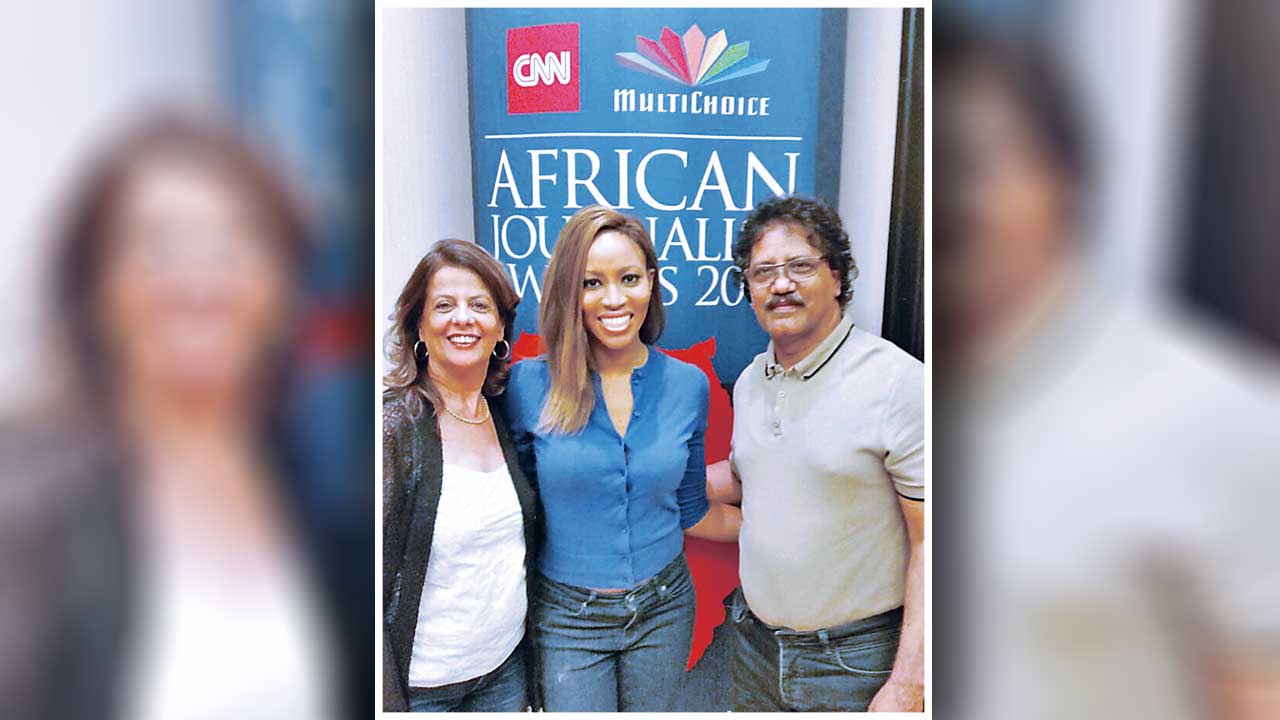
Le Defi Media Group’s Editor in Chief, Ehshan Kodarbux, interviewed last week in Johannesburg, South Africa, CNN’s star anchor of African descent, Zain Asher. She told us that wherever you might be in the world, any person equipped with the right work ethics can make it. She embodied hard work.
Tell us about your background. How did you manage to make it to CNN?
I was born in London but when I was about 10 years old, my mother sent me to live in Nigeria with my grandparents. She wasn’t with me. So I asked her why? She said it was because she wanted me to be able to handle anything in life and she believed that living in West Africa for a few years would make me a much stronger person. And she was right. Just having those two years there, especially during a formative age of 10 when you are a sponge and you absorb everything, has changed my life. It changed my work ethics because it meant that I never took anything for granted. My parents left Nigeria towards the end of the Biafran war [The Biafran War was fought from 1967 to 1970 when Eastern Nigeria tried to secede from Nigerian federal government.] So I was always very keenly aware in my mind growing up in London about how much they had sacrificed and given up to raise us in a different country. My mother had left behind her family, her friends to this strange country where she didn’t know anyone. So I always wanted to make her proud because of the sacrifices she made.
Do you believe that someone who is born, raised and managed to study in Africa would be able to make it the same way you managed to?
100%. The reason I say that is because I’ve seen examples with my own eyes. I host a show ‘Marketplace Africa’ on CNN and that gives me access to some of the biggest entrepreneurs on the continent and to witness some of the amazing innovative things they’re doing. So for example, last week, I was blown away by one person that I met. A guy named Dr. Cosmas Maduka who was born in Lagos, raised in Lagos. His father died when he was six, he stopped going to elementary school, he left primary school and he used to be a street hawker balancing on his head cashew nuts. Now, fifty years later, he runs one of the biggest cargo ship networks in Nigeria (CEO of Cosscharis Group of Companies) and has a net worth of $500million. That is somebody who was born in Africa, raised in Africa, never educated abroad. While he was making it, he couldn’t read and write, now he can, but he explained that because he didn’t finish elementary school, when he reads and he writes, he is very slow. So every single barrier that you can imagine was thrust at him but he still made it. And he employs people, so he is giving back.
Do you think that international broadcasters like CNN are doing enough to give their chance to other Africans or is it only a question of one in a thousand?
I absolutely do because I know people who have obtained opportunities with CNN. You have to bear in mind that a lot of people that we have hired on the continent previously have ended up (Africans who are on the continent working for CNN) getting promoted and then they end up changing their jobs.
For example, one of our East African correspondents did such a good job and showed such amazing journalism while she was here, that she ended up getting promoted for a bigger role at the London bureau where she would be the face of more prominent stories. So there’s an example of people who are from the continent, being hired and doing well.
But what more can be done to help apart this kind of award?
What is interesting about this is that it really changes the lives of journalists who apply. I tried to talk to a handful of the panel list about their experience, the journey they’ve been on in order to get their work submitted. Some of them were telling me that this is the eighth or ninth time that they have actually applied for these awards and what the struggles they went through to get their stories, such as risking their lives. Some of them are living in exile, they can’t get back to their own country because they fear death or imprisonment. So what I’ve learnt from this is that this is a huge path for nurturing talent on the continent. The people who win come back and talk to us about how it changed their lives because before they couldn’t have access to the President, they couldn’t interview the President, now they can interview the President because they won this award. So I think this is an important step in the right direction. One thing that I think needs to change for African journalists is the resources. I think that the resources make it very difficult to do your job, especially when it comes to listening to some of the stories. It takes a much longer time to get the story than it would for me, for example living in America, because they have so many infrastructure barriers. Whether you are in an office in Nigeria and all of a sudden, there is no power or you rely excessively on generators which are expensive for the cooperation because of fuel cost overall. So there are problems with infrastructure and in cooperation, you are only going to be as good as infrastructure, in the environment in which you work. So that needs to change.
About nurturing talents, can you tell us about your meeting with last year’s winner in Atlanta?
Every year the overall winner of the CNN MultiChoice African Journalist Award gets to travel to Atlanta to the CNN headquarters and spend time on the international desk, with the anchors, with producers to see how it works in a massive news organisation with lots of resources. That is a huge part of nurturing talents because they get exposure to journalists and to a massive conglomerate that they would never have otherwise.
Training and exposure are important. What advice would you give to a young person aspiring to achieve what you have achieved so far?
Regardless of where you are in the world, whether you are in Africa, whether you are in the United States, I think that work ethic is hugely important. That is something that has inspired me about this year’s journalists. Despite resources, despite issues with funding, may be low wages and low salaries, the work ethic is first class. And wherever you are making it in this life, you need a strong work ethic. I always say that it is not how good you are but it is how good you want to be. It is about determination to get the story. Some people might try to get a story once or twice and then it does not work and they give up. Other people would try for years and years to getting access, to hold people accountable, to risk their lives and that is what makes a good journalist. So regardless of where you are, yes the opportunities might be different, yes the infrastructure might not be there but if you have the work ethic and the determination, I believe that you can succeed.
What’s next in your career?
I honestly love my job. I have a great combination of being able to anchor stories or anchor on report but also come back to the continent as well and if I could change one thing or enhance my career, my day to day life in anyway, it would be that I come back more and more to the continent. So I am exploring with CNN different ways to do that. You know obviously the African Journalist Award is one way. Another way is through ‘Marketplace Africa’ which is a sponsored show that I host on CNN and that allows me to come back four or five times a year. So we are just exploring different ways to make sure that I can continue my presence on the continent because Africa is such an important market to us. So that is my only dream in terms of what I would like more of.
BIO
Who is Zain Asher?
Zain Asher is the anchor of ‘CNN Newsroom’ on CNN International and is based at the network’s headquarters in Atlanta. Zain also hosts ‘Marketplace Africa’, CNNI’s premier weekly business show is about the continent and its place within global markets. Born and raised in London, Zain graduated from Oxford University where she studied French and Spanish and graduated with a distinction in Oral Spanish. In 2006, she earned an MS from Columbia University’s Graduate School of Journalism. She has lived and worked in Mexico, France and Nigeria and is fluent in lbo (her native Nigerian dialect) as well as French and Spanish. Zain has covered a number of general news stories from the field including Nigeria in 2014, where the kidnapping of hundreds of schoolgirls by Boko Haram militants caught the world’s attention, and from Boston following the 2013 terrorist attack at the Boston Marathon. She has also anchored breaking coverage of various international stories ranging from Greece’s debt crisis, the Charlie Hebdo terror attacks in Paris and the 2015 earthquake in Nepal.
SOURCE: CNN
Interview: Ehshan Kodarbux | Transcription: Jameela Jaddoo
 J'aime
J'aime














